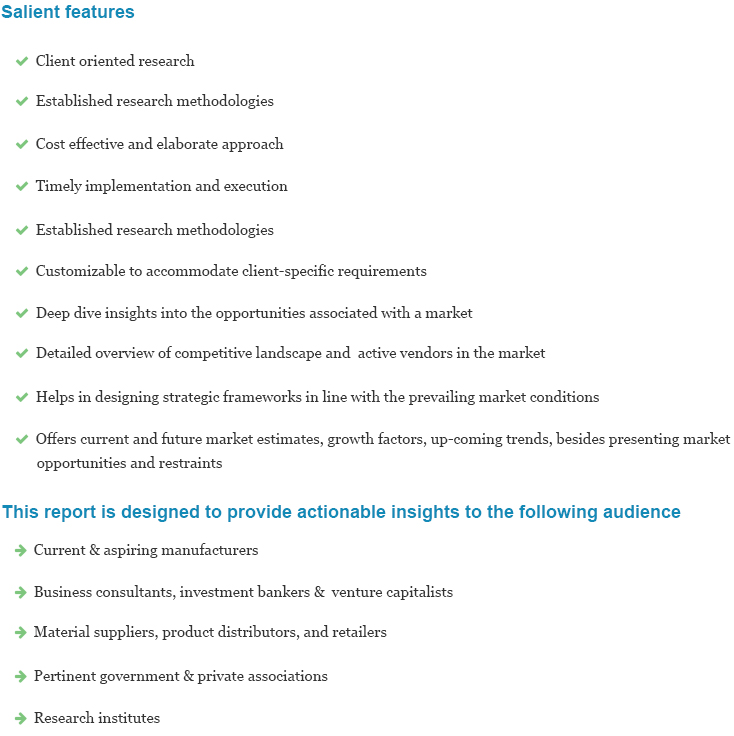
Benzoic Acid Market Analysis, Market Size, Application Analysis, Regional Outlook, Competitive Strategies and Forecasts, 2016 To 2024
- Published: December, 2016
- Format: Electronic (PDF)
- Number of pages: 90
- Industry: Organic Chemicals
The global Benzoic Acid Market is anticipated to exceed 640 kilotons (KT) by 2024 from 480 kilotons in 2014. It could expand at over 3.2% CAGR over the forecast period (2016-2024). High demand for preservatives for longer shelf life of products and the expansion of the food & beverages industry are factors that drive this market.
The popularity of ready-to-drink (RTD) beverages and convenience foods may propel the market in North America and Europe. Demand for RTD beverages & convenience foods is attributed to the fast paced lifestyles in these regions. This propels the need for packaged foods & beverages. Such a trend may positively impact the global market since benzoic acid is used as a preservative. This acid restricts the growth of bacteria & yeast in edible products.
Benzoic acid is a colorless crystalline compound belonging to the group of carboxylic acids. Besides being used as a food preservative, it is also used in insect repellents, plastics, dyes, and others. It is a key component in creams, lotions, and ointments. Salts and esters of the compound are known as benzoates. The esters are used in pesticides, disinfectant additives, dyeing carriers, solvents, and in the production of different compounds. It is produced commercially by the oxidation of toluene.
Benzyl alcohol and sodium & potassium benzoates are the prime derivatives of benzoic acid. Global production capacity of sodium benzoate is 100 kilo tons per year, while that of potassium benzoate is 7 kilo tons. Potassium benzoate is mostly used as a preservative in soft or energy drinks. Benzyl alcohol is utilized in paints and coatings. It is also used in the production of benzyl esters, which are used in the flavors & fragrances industry.
Sodium benzoate is naturally present in dairy products and in berries. It is mostly found in preserved foods, such as sauces, pickles, soft drinks, and juices. Furthermore, it is a preferred component in the cosmetics industry. Sodium benzoate is used in deodorants, aftershave lotions, and sunscreens to reduce skin irritations and inflammations. When used in alkyd resins, it improves the chemical resistance and glossiness of surface coatings.
The global Benzoic Acid Market is divided on the basis of methods, applications, end users, and regions. Major methods used are Friedel-crafts reaction & chlorination methods, oxidation by hydrolysis, and Grignard reagents. Benzoic acid is converted into phenol or caprolactam for commercial use. Applications include foods & beverages, plasticizers, animal feed additives, phenol, dibenzoates, alkyd resins, cosmetics, and others.
Global phenol demand exceeded 8.5 million tons in 2013. This would benefit the global market, as benzoic acid is a key component used in the production of phenol. Dibenzoates can exhibit a significant growth rate over the forecast period.
Foods & beverages was the largest application, accounting for more than 45% demand (in terms of volume) in 2014. It is expected to grow at a CAGR over 2.8% in the forecast period. Potassium & sodium benzoates in the foods & beverages industry are mostly used in canned foods. They act as food preservatives in pickles and sauces. Another vital market application is antimicrobial packaging, due to benzoic acid’s ability to inhibit bacterial growth.
Benzoate plasticizers can grow at a CAGR over 9% in the next eight years. Rising demand of phthalate-free plasticizers can be favorable for the market. Benzoate plasticizers, such as diethylene glycol and triethylene glycol ether can be used as substitutes in films, cables, and hoses. But fluctuating prices of toluene may hamper industry growth.
Benzoic acid is used in animal feeds, mainly those of pigs and poultry. It prevents the growth of bacteria in the intestinal tracts of these animals. Novus Biologicals has launched a new product named ‘Avimatrix’. It contains benzoic acid mixed with vegetable fat that allows active ingredients to be released in the gut. This promotes weight gain in birds in nearly 42 days and also clears their digestive tracts. Such a development may result in high demand for quality meat and thus benefit the global market.
Major end-users include chemicals, plastics, and pharmaceutical industries. The chemicals industry uses this compound in adhesives, sealants, and other related products. Regions covered under the global industry are North America, Europe, Asia Pacific, and RoW (Rest of the World). Asia Pacific led the Benzoic Acid Market in 2014, accounting for over 60% demand in the same year. This can be attributed to rising income levels and surging demand for RTD beverages in India and China. This region could grow further by catering to phenol production. China leads the regional market owing to significant demand for benzoate plasticizers. But it mainly produces sodium benzoate and benzoyl chloride.
Europe was the second largest market, generating over 20% volumes in 2014. Estonia, a country in North Europe, produced nearly 600,000 tons of shale oil in 2012. A number of chemical companies, such as Henkel Macro-Flex AS and Akzo Nobel N.V. are situated in this country. Eastman Specialties produces plasticizers, sodium benzoate, and benzoic acid. Most companies operating in the region have to comply with REACH (Registration, Evaluation, Authorisation and Restriction of Chemicals) regulations and minimize pollution. U.K. sales for benzoic acid were nearly USD 6.2 million in 2012.
The U.S., a prime region in North America, contributed to over 10% of the global demand (in terms of volume) in 2014. North America may record a stable growth rate in the next eight years. Strict regulations regarding the use of phthalate plasticizers could drive this market.
Major players in the global Benzoic Acid Market are Emerald Kalama, Shree Hari Chemicals Export Ltd., Novaphene, Chemcrux Enterprises Ltd., and Wuhan Youji Industries among others. ‘Emerald Kalama’ declared in 2015 that it would spend heavily on the production of high purity benzoic acid-based products at Rotterdam. The company has also collaborated with The Chemical Company (TCC) to distribute its K-Flex plasticizers. This can expand its global reach immensely.
Ferro Corporation, an American company, is expected to increase its production capacity by installing a dibenzoate plant in Belgium. It could strengthen its position in the industry by producing almost 28,000 metric tons on an annual basis. This will allow the company to offer high-performance plasticizers to manufacturers without relying on a non-phthalate solution. Low crude oil prices will encourage the growth of the global market in the coming years.

Choose License Type
- World's largest premium report database
- Transparent pre & post sale customer engagement model
- Unparalleled flexibility in terms of rendering services
- Safe & secure web experience
- 24*5 Research support service
